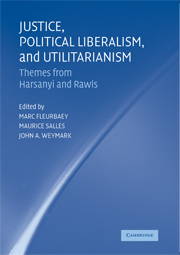Book contents
- Frontmatter
- Contents
- Preface
- List of Contributors
- 1 An Introduction to Justice, Political Liberalism, and Utilitarianism
- PART ONE THEMES FROM RAWLS
- PART TWO HARSANYI'S IMPARTIAL OBSERVER AND SOCIAL AGGREGATION THEOREMS
- PART THREE GOODNESS AND WELL-BEING
- 9 Can There Be a Preference-Based Utilitarianism?
- 10 Harsanyi, Rawls, and the Search for a Common Currency of Advantage
- 11 Utilitarianism versus Fairness in Welfare Economics
- 12 Rationality and Want-Satisfaction
- PART FOUR SHARING THE GAINS FROM SOCIAL COOPERATION
- PART FIVE RIGHTS AND LIBERTIES
- Index
11 - Utilitarianism versus Fairness in Welfare Economics
Published online by Cambridge University Press: 09 February 2010
- Frontmatter
- Contents
- Preface
- List of Contributors
- 1 An Introduction to Justice, Political Liberalism, and Utilitarianism
- PART ONE THEMES FROM RAWLS
- PART TWO HARSANYI'S IMPARTIAL OBSERVER AND SOCIAL AGGREGATION THEOREMS
- PART THREE GOODNESS AND WELL-BEING
- 9 Can There Be a Preference-Based Utilitarianism?
- 10 Harsanyi, Rawls, and the Search for a Common Currency of Advantage
- 11 Utilitarianism versus Fairness in Welfare Economics
- 12 Rationality and Want-Satisfaction
- PART FOUR SHARING THE GAINS FROM SOCIAL COOPERATION
- PART FIVE RIGHTS AND LIBERTIES
- Index
Summary
Introduction
Utilitarianism has been opposed to theories of fairness (especially Rawls's theory) in many respects. We want to focus here on a particular division that has been seldom discussed, although it is reflected in the structure of welfare economics. Welfare economics is indeed currently separated into two very different branches. One branch deals with social welfare functions and devotes a substantial energy to the study of utilitarianism. The other studies fair allocation in economic models and, formally, its main focus is on allocation rules. The difference is the following. A social welfare function associates each member in a class of possible contexts with a ranking of all possible alternatives, whereas an allocation rule only associates each member in the class with a selection of “best” alternatives. As it has long since been noted in the theory of social choice, an allocation rule is a kind of ranking, albeit simple (any two selected allocations as well as any two nonselected allocations being deemed socially indifferent), and a ranking immediately leads to an allocation rule (which selects the best alternative in every context).
Actually, there is a second important difference between these two branches. The arguments of the social welfare functions studied by the former are interpersonally comparable utilities (usually comparable in levels, differences, or ratios), whereas the whole body of literature representing the latter is purely ordinal, making use of no other welfare information than the preferences of the agents over simple alternatives.
- Type
- Chapter
- Information
- Justice, Political Liberalism, and UtilitarianismThemes from Harsanyi and Rawls, pp. 263 - 280Publisher: Cambridge University PressPrint publication year: 2008
- 6
- Cited by



